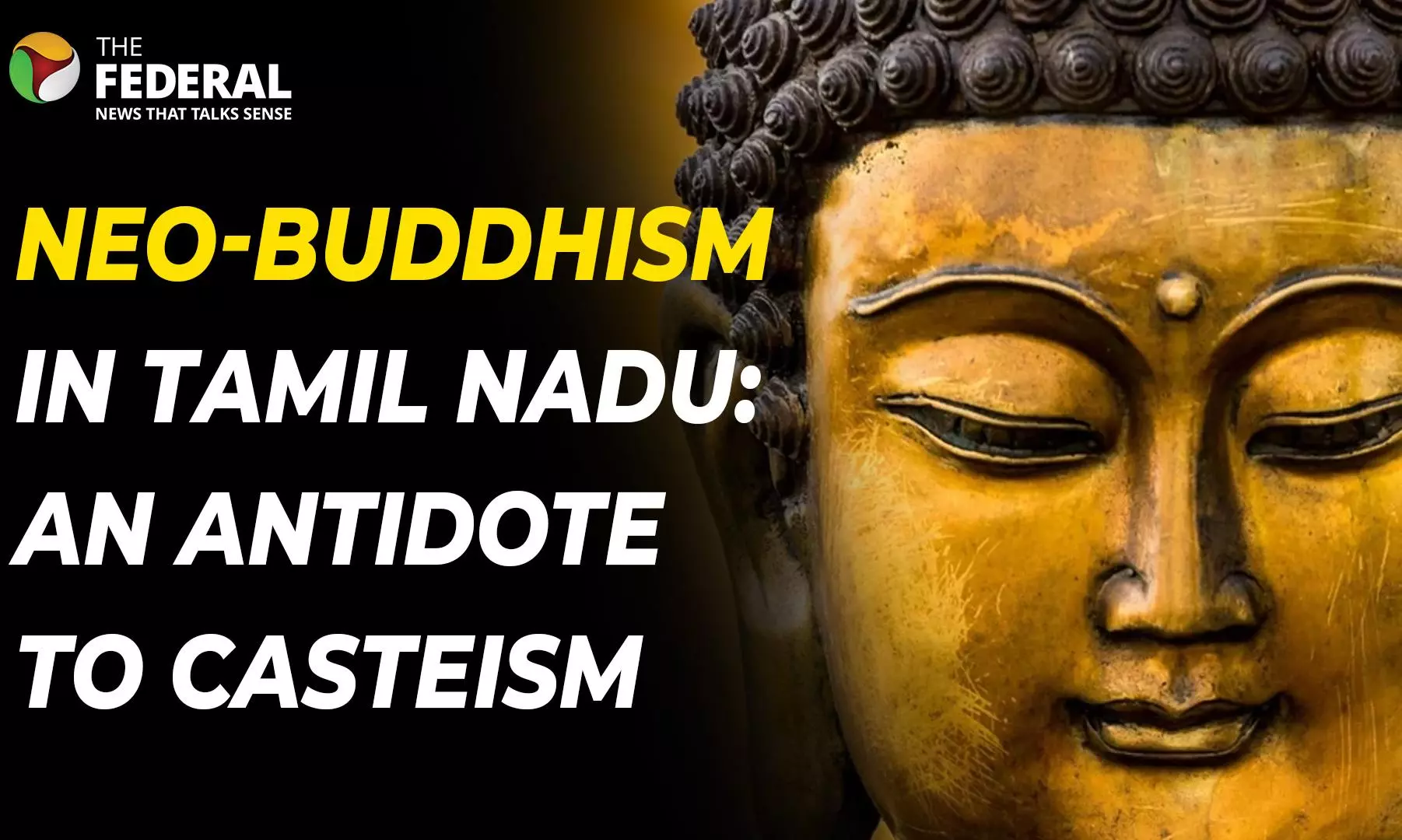
Image of Buddha statue
Conversion to Buddhism a spiritual revolution, political strategy in TN
Conversion to Buddhism grows in Tamil Nadu as Dalits seek liberation from caste oppression. Will this revival reshape the state's socio-political landscape?

In October 2024, 49-year-old ACK Velavan, an anti-caste activist from Achirapakkam village in Tamil Nadu travelled to Deeksha Bhoomi in Nagpur to embrace Buddhism. Born into a Dalit family, Velavan endured lifelong caste-based injustices. His conversion to Buddhism represents a significant step toward personal liberation and hope for future generations.
Recalling his time as the 10th ward councillor of Achirapakkam in 2011, Velavan spoke to The Federal about challenges like securing a cemetery for his community. “There was no cemetery for the people who were killed in that area,” he shared, highlighting the systemic neglect faced by marginalised communities.
A rising tide of converts
Velavan’s story is part of a larger trend of Neo-Buddhist conversions in Tamil Nadu. Many like him turn to Buddhism to escape caste-based oppression and seek spiritual equality. The Neo-Buddhists have devised new ceremonies for life’s milestones, drawing support from local and Sri Lankan monks. Census data reflects this shift: the Buddhist population in Tamil Nadu doubled from 5,393 in 2001 to 11,186 in 2011. Scholars expect the upcoming census to show an even sharper increase, fueled by the influence of figures like BR Ambedkar and anti-caste movements.
Historical and political roots
Tamil Nadu’s connection to Buddhism dates back to the 3rd and 4th centuries CE, when it was a dominant religion in the region. Historical texts and epics like 'Manimegalai' point to its significance. However, as Hinduism appropriated Buddhist practices, the religion’s prominence waned.
The revival began during the Indian independence struggle, led by reformers like Pandit Ayodhya Dasar. Long before Ambedkar’s landmark conversion to Buddhism in 1956, Ayodhya Dasar had embraced the faith and built a temple over 124 years ago, which remains active today. His vision of Buddhism as an alternative to Hinduism aimed to dismantle caste hierarchies.
Cultural impact and representation
Buddhism’s resurgence is also reflected in Tamil Nadu’s cultural landscape. Filmmakers like Pa. Ranjith and Mari Selvaraj incorporate Buddhist imagery and principles in their films, addressing caste discrimination and advocating equality.
“Films discussing caste oppression often reference Buddha and Buddhist concepts,” said writer P. Vijayakumar. He echoed this sentiment, stating, “Buddhism is the foundation for the anti-caste ideology that developed in Tamil Nadu.”
Buddhism and social justice
Buddhism’s principles have significantly influenced Tamil Nadu’s social and political policies. S. Gautaman, president of South India Buddha Vihar, emphasised how these values underpin the Dravidian parties’ focus on social justice.
The teachings of Ambedkar and Ayodhya Dasar continue to inspire movements advocating for equality and justice, ensuring that Buddhism remains central to the fight against caste oppression.
For Velavan and countless others, embracing Buddhism signifies more than a religious shift; it’s a transformative act of resistance. As Tamil Nadu’s Buddhist population grows, the movement raises critical questions like, can this revival challenge entrenched caste structures and lead to an inclusive society? The answers may reshape the region’s social and cultural fabric for generations to come.
The content above has been generated using a fine-tuned AI model. To ensure accuracy, quality, and editorial integrity, we employ a Human-In-The-Loop (HITL) process. While AI assists in creating the initial draft, our experienced editorial team carefully reviews, edits, and refines the content before publication. At The Federal, we combine the efficiency of AI with the expertise of human editors to deliver reliable and insightful journalism.

